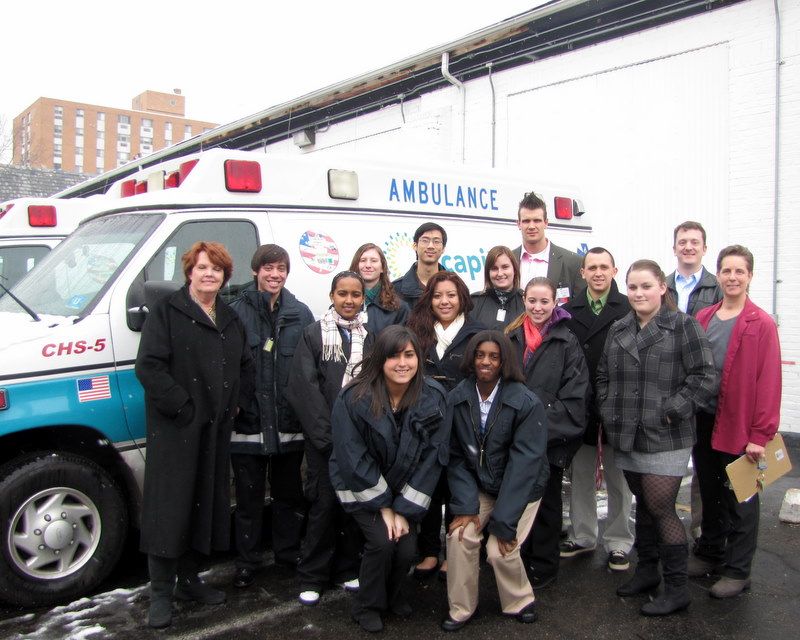Friday, Jan 21, 2011
Through the BIO 210: Rider Hospital Intern Program, undergraduate students have the chance to shadow physicians, nurses and paramedics at Capital Health campuses.
by Meaghan Haugh
Rider University’s Science programs enjoy a strong reputation of offering early hands-on learning in the laboratory for its undergraduate students. In addition to collaborating on research with faculty members, students also have the chance to gain experience in the field. For example, each January, Rider offers a unique internship program for students to learn more about the medical field.
As part of the BIO 210: Rider Hospital Intern Program, 12 undergraduate students were selected to participate in the two-week program, from January 10 through January 21, with Trenton-based Capital Health. Each day, students were assigned to different rotations where they would shadow physicians, nurses, physician assistants and paramedics in a program that is designed to help students learn more about careers in health care to determine whether to apply to medical school.
“It’s really an immersion into what a medical professional’s day is like,” said Dr. Bryan Spiegelberg, assistant professor of Chemistry and chair of the Premedical Studies Committee.
Dr. Thomas C. Mayer, professor emeritus of Biology, started Rider’s field experience program at Helene Fuld Medical Center (now Capital Health Regional Medical Center) and at St. Francis Medical Center in the late 1960s. Dr. John E. Sheats, professor emeritus of Chemistry, Biochemistry and Physics, was involved in the program for a number of years with Mayer. Upon Mayer’s retirement, Dr. James E. Riggs, professor of Biology, assumed the reins. This is Spiegelberg’s first year running the program. Nancy Schlitter, the director of volunteer services at Capital Health, coordinates the program and schedules the rotations.
Students are selected based on their GPAs and dedication to working in the health care field. While the program is open to all undergraduate students, the majority of participants are science majors. Preference is typically given to sophomores who plan to apply to medical school.
“We pick students who can use this experience to further their careers. These are students who are trying to decide what they want to do in the health care profession,” Spiegelberg said. “Our hope is that the students use this as a stepping stone in order to get more experience during the rest of their studies at Rider through other field experiences and internships. Shadowing is a big part of medical school. The students can use this field experience on their résumés and applications.”
For example, sophomore Biology major Tiffany Dill has gained plenty of research experience in Dr. Jonathan D. Karp’s laboratory. During the program’s orientation at Capital Health Regional Medical Center in Trenton on January 7, Dill said she enjoys conducting research, but she wanted to participate in the program in order to learn about possible careers in the medical field.
According to Larry DiSanto ’90, the executive vice president and chief operating officer at Capital Health who received his Master of Business Administration degree from Rider, “There’s a multitude of different professions in hospitals that people don’t know about. The internship program gives students an overview of the hospital and an opportunity to see what medical professionals do.”
During the two-week program, students are asked to write a brief summary of their day in a discussion board on Blackboard in order to allow their classmates to learn about a specific rotation before they begin. Students are also asked to write a description of one or two of the day’s memorable experiences and reflect on their feelings.
“Some students change their minds about their career or health care in general,” Spiegelberg said.
Spiegelberg plans to have the class meet four times during the spring semester in order to discuss the health care field. At the end of the course, the students will be required to write a thesis about a pressing problem facing health care based on readings and their field experience.
The program is an eye-opening experience for students, who are exposed to the hospital’s diverse population, including people who do not have access to health care or cannot speak English, explained Spiegelberg. For example, Capital Health’s Mercer Campus sponsors a basic nutrition program for pregnant women who are undocumented citizens and have no means for health care. Other cases could include suicides, burn victims and patients with pregnancy complications.
“Students come out of this experience changed,” he said.
The program is sponsored through generous support of two New Jersey corporations, Bristol-Myers Squibb and Becton-Dickinson, whose funding is provided through the ICFNJ (The Independent College Fund of New Jersey) of which Rider University is a member.
Students participating in this year’s program also include Samantha Bremerman, a junior Behavioral Neuroscience major; Michael Briehler, a College of Continuing Studies student; Jackelyn Cua, a senior Biology major; Jessie Lee Cunningham, a sophomore Biology major; Ashley Hines, a sophomore Biology major; Thaiphi Luu, a sophomore Biology major; Kate O'Brien, a sophomore Biology major; Elham Oumer, a senior Biology major; Cassandra Panaro, a sophomore Biology major; Corey Roach, a sophomore Behavioral Neuroscience major; and Matthew Springer, a junior Biology major.

